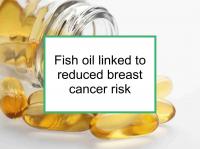A new study has reported on how fish oil reduces mammary tumor risk. Population studies concerning the effect of omega-3 fatty acid consumption on breast cancer prevention remain inconclusive; cell and animal studies are more conclusive. However, the mechanism of action has not been determined.
To conduct the study, the authors used a rat model of breast cancer, in which tumors were induced using a carcinogen. The influence on tumor development of fish oil alone and in combination with the anti-estrogen tamoxifen were examined using a comprehensive panel of biomarkers which are thought to be critical in the progression to invasive cancer.
Fish oil-rich diets were found to significantly reduce Ki-67, a measure of proliferation, in hyperplastic lesions, which are precancerous tissues with abnormal increases in the number of (normal) cells. Neither dietary fish oil nor tamoxifen had major effects on systemic oxidative stress biomarkers, including oxidative damage to DNA.
On the other hand, mammary tissue levels of 8-isoprostane (which is produced by peroxidation of arachidonic acid) were markedly reduced in fish oil-fed rats, possibly as a result of fish oil-induced depletion of arachidonic acid in the mammary gland. Arachidonic acid, an omega-6 fatty acid, has been shown to promote breast cancer development and metastasis.
The authors conclude that the protective effect of omega-3 fats in this experimental system was not mediated by changes in the levels of systemic oxidative stress, but instead may result from suppression of arachidonic acid-specific pathways.
